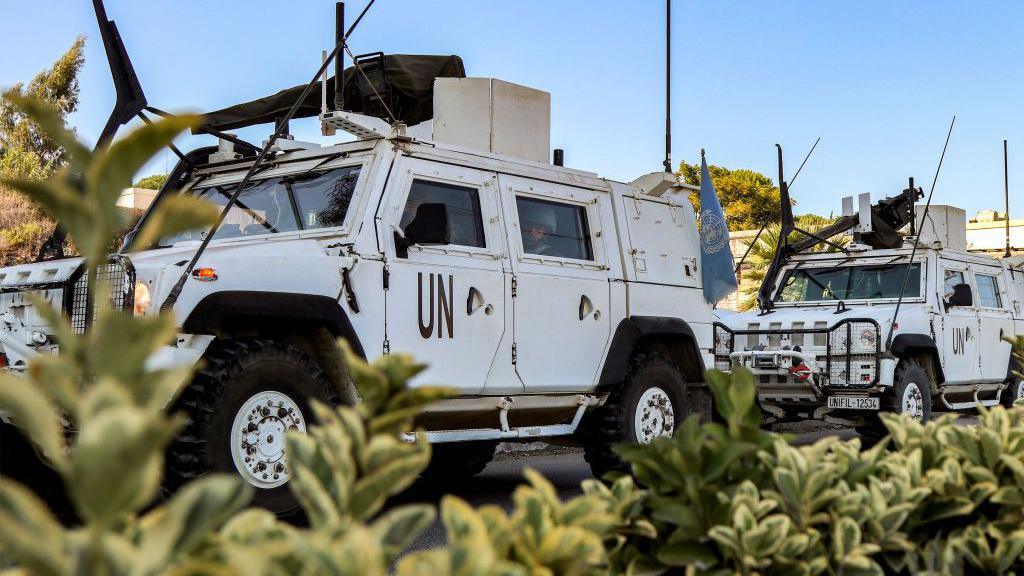Israel attacks on UN in breach of international law, Harris says
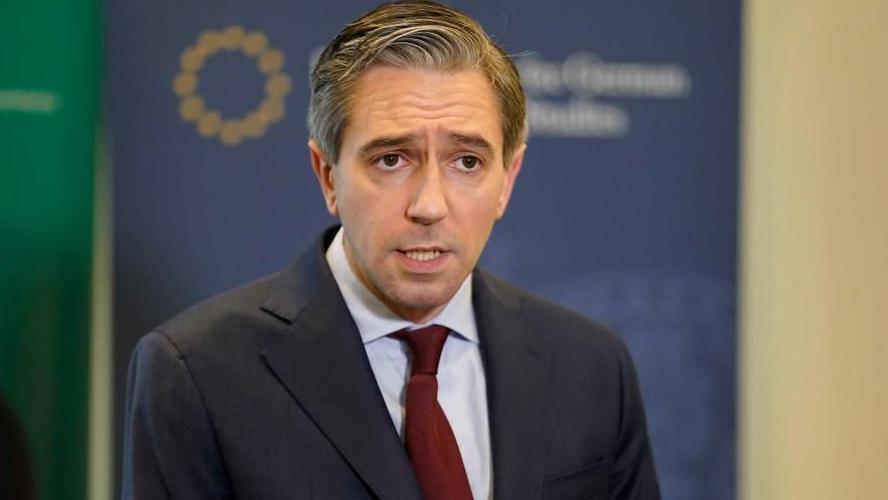
Speaking to BBC News in Washington DC, Harris described the attacks as "despicable"
- Published
The Taoiseach (Irish Prime Minister) Simon Harris has described Israel’s attack on UN peacekeepers in Lebanon as a breach of international law.
Speaking to BBC News in Washington DC, Harris said it was an "extraordinarily concerning development".
The IDF has acknowledged that its troops "opened fire in the area" of the base in Naqoura on Thursday after instructing UN troops to "remain in protected spaces".
Ireland has 379 troops in Lebanon as part of the UNIFIL peacekeeping mission. None were hurt in recent attacks, but two Indonesian soldiers were injured on Thursday.
Two other peacekeepers were injured in a separate explosion on Friday which the IDF has said it is investigating.
'Despicable attacks'
The taoiseach described attacks on three United Nations Interim Force positions in Lebanon (UNIFIL) as "really dangerous, despicable attacks on peacekeepers".
He added that the IDF had positioned themselves at a UNIFIL outpost which was being manned by about 30 Irish peacekeepers, but had since moved following UN and US intervention.
The taoiseach said that he was protesting "at the highest levels" in relation to the attack, and said that the United Nations, and all of the countries making up the peacekeeping mission should "speak with one voice" about what he called Israel's breach of international law.
However, he said he was concerned that "Israel doesn't listen".
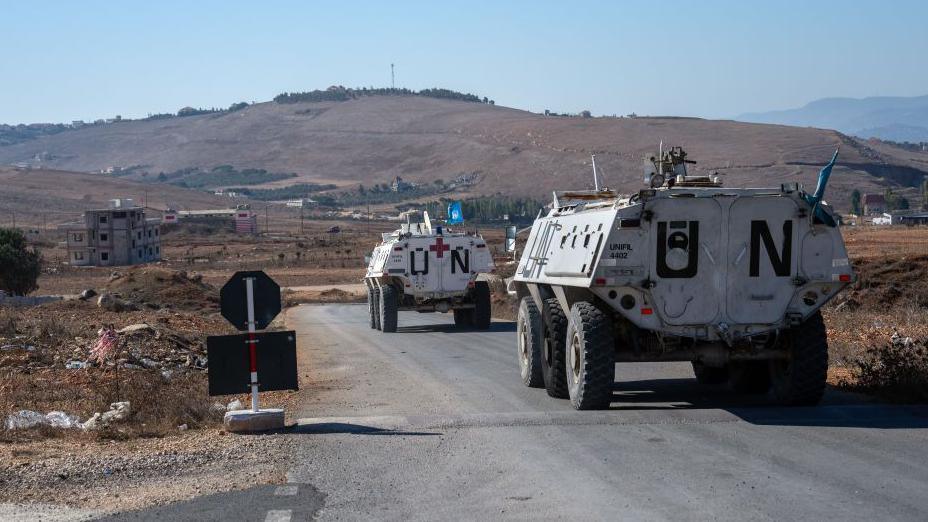
UNIFIL armoured personnel carriers depart a base to patrol near the Lebanon- Israel border
Harris added that Israel had "a right to defend itself, a right to live in peace and security" and that no-one disputed that but that “international law has to be followed, and proportionality also has to be due”. He said neither of those tests were currently being met.
He said he had spoken to the US President Joe Biden twice in recent days, including at an hour-long meeting in the Oval Office on Wednesday.
He said he had also spoken to UN Secretary General Antonio Guterres about the matter.
'Appalled'
On Friday UNIFIL reported that two more peacekeeping troops had been hurt in two explosions near the Naqoura base.
The IDF said Israeli soldiers in southern Lebanon had identified a threat and responded with fire.
The Israeli military said it had struck the UNIFIL post, which was about 50m away from the source of the threat. It said it had earlier told UNIFIL troops to stay in a protected space and added that it was continuing to examine the incident.
The UK government has said it is “appalled” by reports that Israel deliberately fired on the base.
US President Joe Biden has asked Israel not to hit UN peacekeepers while carrying out operations against Hezbollah, and France, Italy and Spain released a joint statement, saying attacks on peacekeepers are "unjustifiable and should immediately come to an end".
In an evening update, the Irish Defence Forces confirmed all personnel "are well and accounted for".
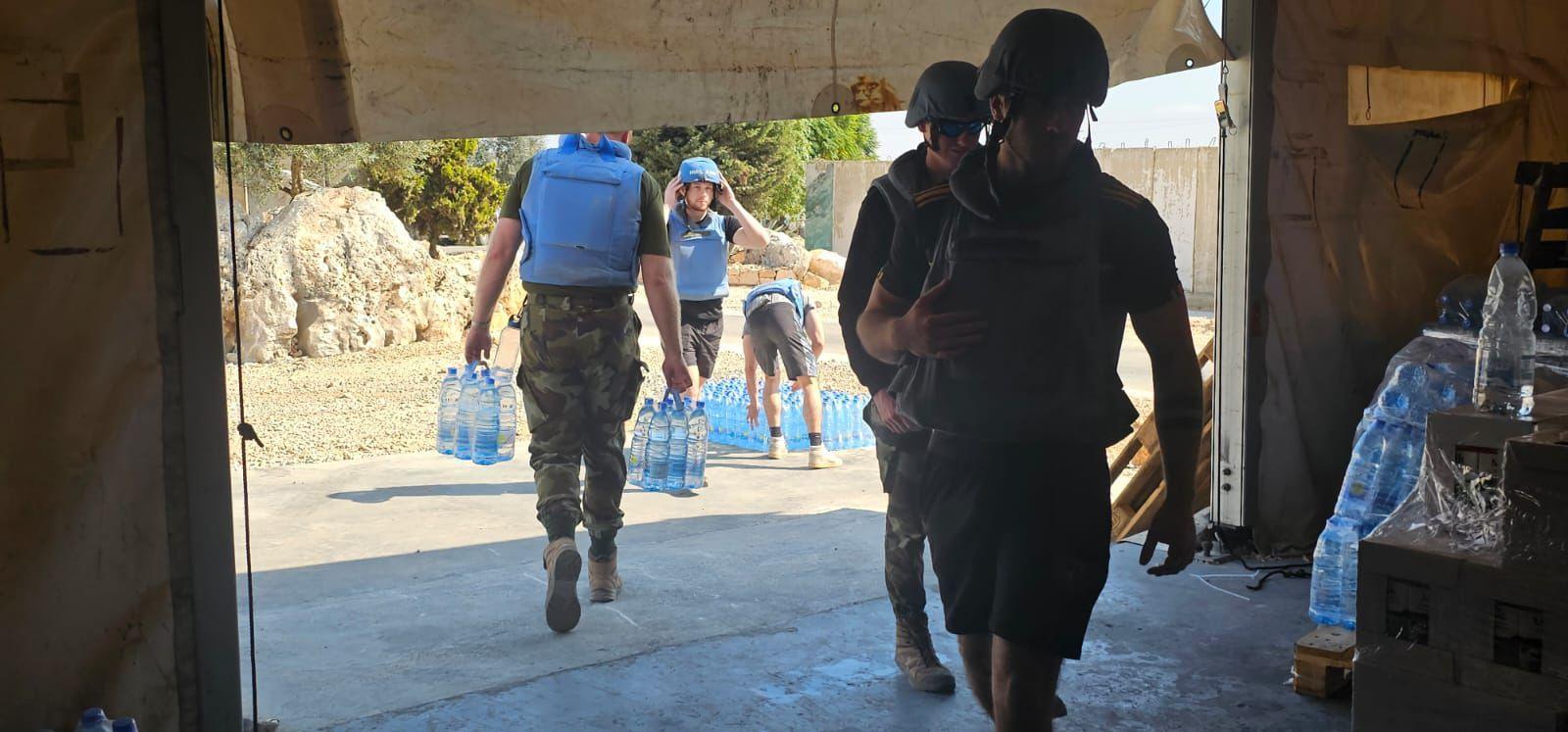
All Irish personnel were "well and accounted for", the Defence Forces said on Friday evening
Israel has requested that the UNIFIL peacekeepers withdraw from southern Lebanon, but the taoiseach rejected that.
He said: “We cannot have a situation where aggression can force a peacekeeping mission to leave."
Harris said the IDF and Hezbollah needed to “respect the role of our peacekeepers” and what was needed was an “urgent de-escalation” and a ceasefire.
Irish Defence Forces Chief of Staff Lieutenant General Seán Clancy described attacks on UN peacekeepers as an "egregious violation".
He said the Israeli military needs to be held accountable as their actions were "reckless" and cannot be tolerated.
Lt Gen Clancy told Irish broadcaster RTÉ that he did not believe the Israeli claim that the strikes were inadvertent.
"From a military perspective this is not an accidental act. It is a direct act," he said.
"Whether its indiscipline or directed, either way it is not conscionable or allowable."
'The firing has been direct'
US urges Israel to ensure UN peacekeepers’ safety in Lebanon
- Published12 October 2024
No 10 'appalled' by Israel attacks on UN bases
- Published11 October 2024
On Friday evening, the head of UN Peacekeeping Jean-Pierre Lacroix said there is reason to believe some of Israel's firing at peacekeepers in Lebanon was direct.
“We have reason to believe that in some cases the firing has been direct," he told BBC's Newshour programme.
"For example we have a case where a tower was hit by a fire and also damages to cameras at one of the positions – which obviously to us very much looked like direct fire."
Lacroix added that parties involved in the conflict had obligations to respect peacekeepers safety.
"There is a risk for more of this incident, and it is highly important to keep conveying these messages... the idea to all parties that peacekeepers need to be respected."
On Harris's earlier remarks, Mr Lacroix told BBC News: "Certainly the firing against peacekeepers position is in violation of international obligation. That is absolutely clear."
He added that although the peacekeepers are in "difficult and dangerous conditions", they have made a "considerate decision" to remain situated in position and fulfill their mandates.
'Hard to take a lecture'
Israel alleges that that the UN has failed to enforce the 1701 resolution which called for a demilitarised zone and the disarmament of Hezbollah and this was partly to blame for the current conflict.
For its part, UNIFIL has said Israel's ground invasion of southern Lebanon constitutes a violation of resolution 1701.
Harris said: “It’s very hard to take a lecture from Israel in terms of holding UN resolution right now, or indeed international law, when we’ve seen completely disproportionate war and the impact that that has had from the humanitarian crisis point of view of civilians, including children."
The taoiseach said there were “significant lessons” that could be learned from the Northern Ireland peace process, and the first was to “never allow the world to believe that a terrorist organisation is the same as a country”.
Ireland is one of several European countries that has recognised the state of Palestine.
The taoiseach said it took that decision because “we know Palestine is not Hamas".
He said: "Hamas is a despicable, disgusting terrorist organisation that should be condemned outright by all right thinking people, but we know what it's like in Ireland to have efforts to hijack and sabotage your national identity and your flag by terrorists, and we can never stand for that."
Related topics
- Published7 October 2024
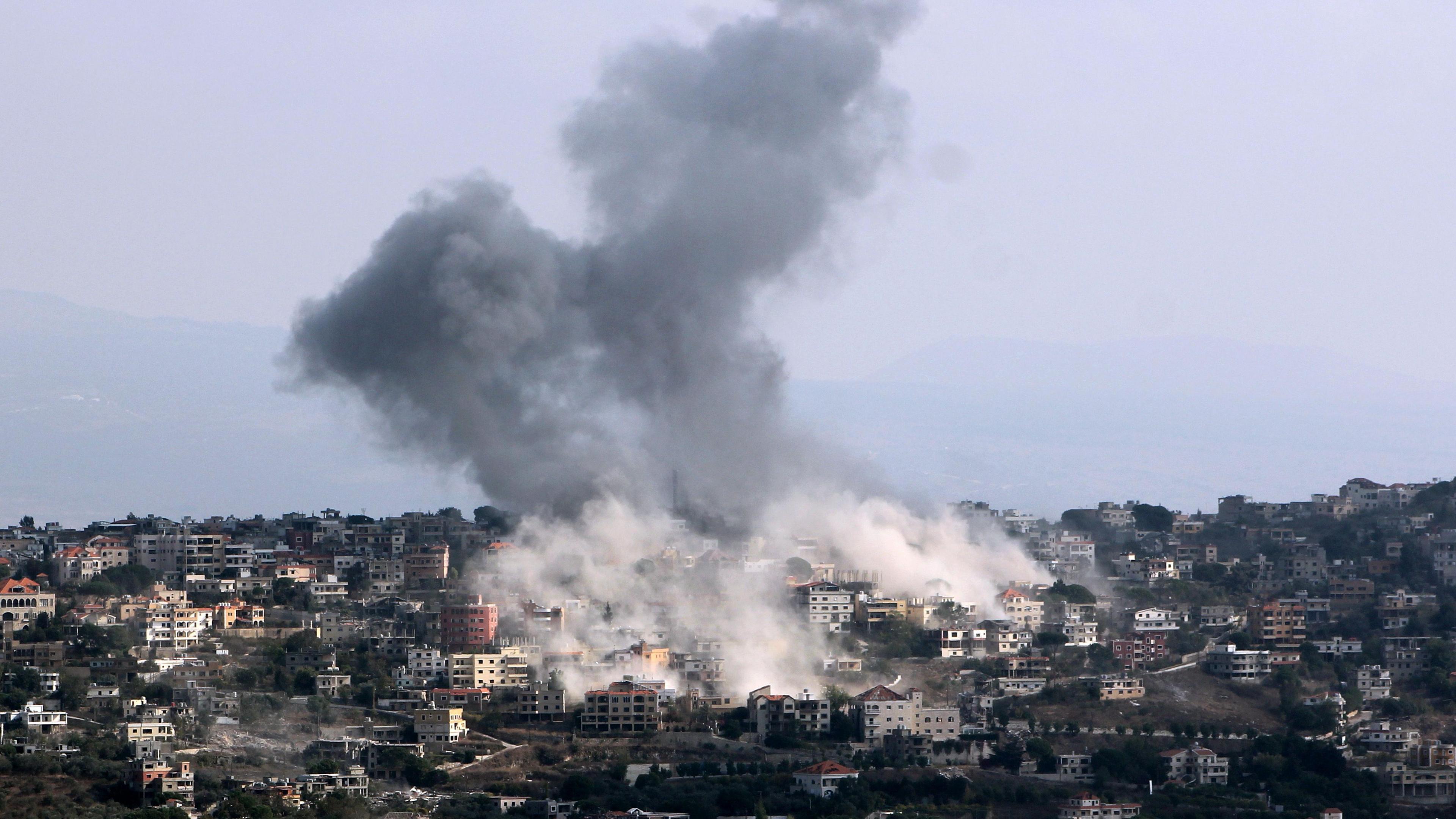
- Published9 October 2024
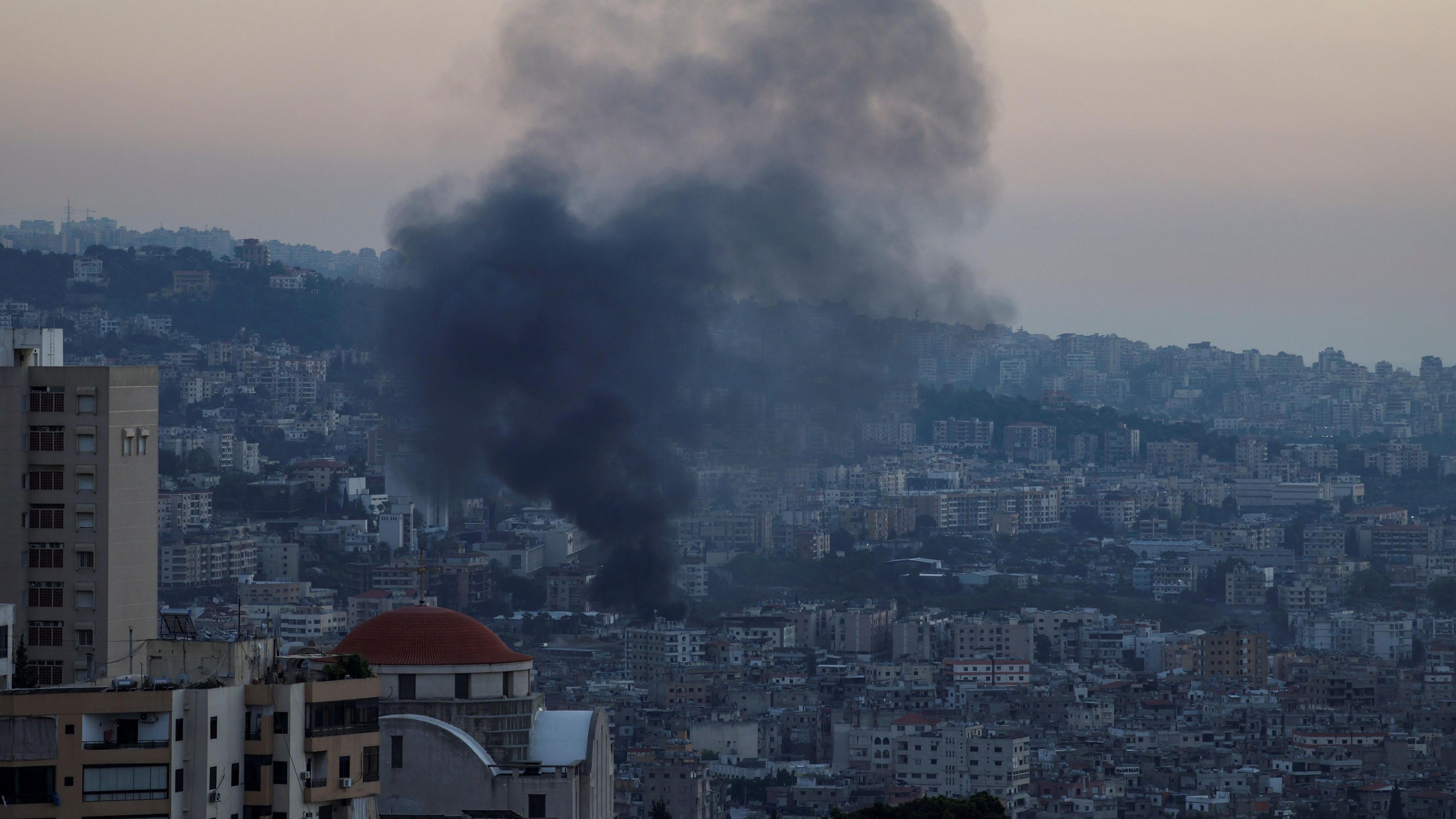
- Published10 October 2024
